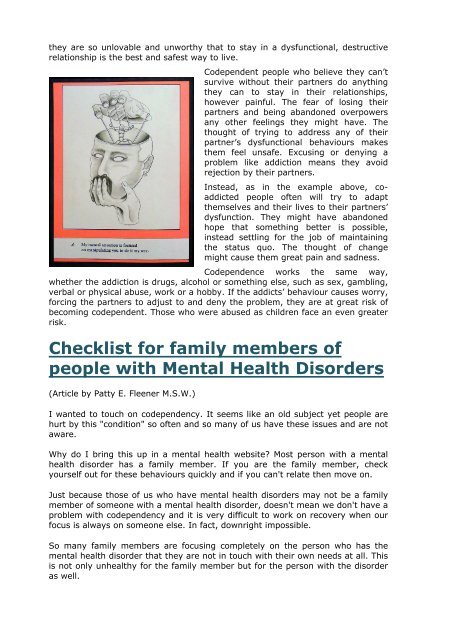personality disorders explained
Antisocial Personality Disorder, Codependence, Narcissism and Borderline
Antisocial Personality Disorder, Codependence, Narcissism and Borderline
Create successful ePaper yourself
Turn your PDF publications into a flip-book with our unique Google optimized e-Paper software.
they are so unlovable and unworthy that to stay in a dysfunctional, destructive<br />
relationship is the best and safest way to live.<br />
Codependent people who believe they can’t<br />
survive without their partners do anything<br />
they can to stay in their relationships,<br />
however painful. The fear of losing their<br />
partners and being abandoned overpowers<br />
any other feelings they might have. The<br />
thought of trying to address any of their<br />
partner’s dysfunctional behaviours makes<br />
them feel unsafe. Excusing or denying a<br />
problem like addiction means they avoid<br />
rejection by their partners.<br />
Instead, as in the example above, coaddicted<br />
people often will try to adapt<br />
themselves and their lives to their partners’<br />
dysfunction. They might have abandoned<br />
hope that something better is possible,<br />
instead settling for the job of maintaining<br />
the status quo. The thought of change<br />
might cause them great pain and sadness.<br />
Codependence works the same way,<br />
whether the addiction is drugs, alcohol or something else, such as sex, gambling,<br />
verbal or physical abuse, work or a hobby. If the addicts’ behaviour causes worry,<br />
forcing the partners to adjust to and deny the problem, they are at great risk of<br />
becoming codependent. Those who were abused as children face an even greater<br />
risk.<br />
Checklist for family members of<br />
people with Mental Health Disorders<br />
(Article by Patty E. Fleener M.S.W.)<br />
I wanted to touch on codependency. It seems like an old subject yet people are<br />
hurt by this "condition" so often and so many of us have these issues and are not<br />
aware.<br />
Why do I bring this up in a mental health website? Most person with a mental<br />
health disorder has a family member. If you are the family member, check<br />
yourself out for these behaviours quickly and if you can't relate then move on.<br />
Just because those of us who have mental health <strong>disorders</strong> may not be a family<br />
member of someone with a mental health disorder, doesn't mean we don't have a<br />
problem with codependency and it is very difficult to work on recovery when our<br />
focus is always on someone else. In fact, downright impossible.<br />
So many family members are focusing completely on the person who has the<br />
mental health disorder that they are not in touch with their own needs at all. This<br />
is not only unhealthy for the family member but for the person with the disorder<br />
as well.

















